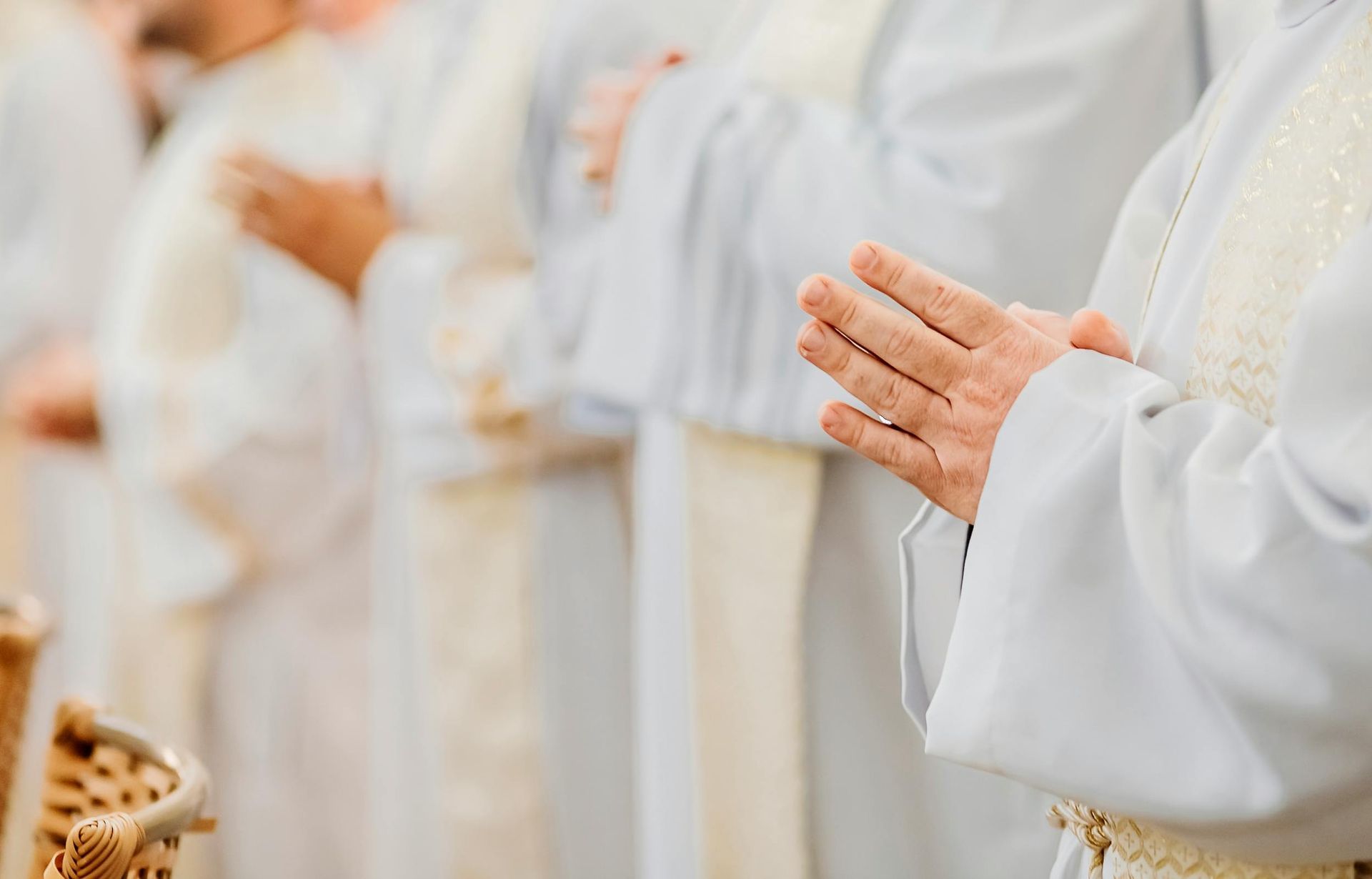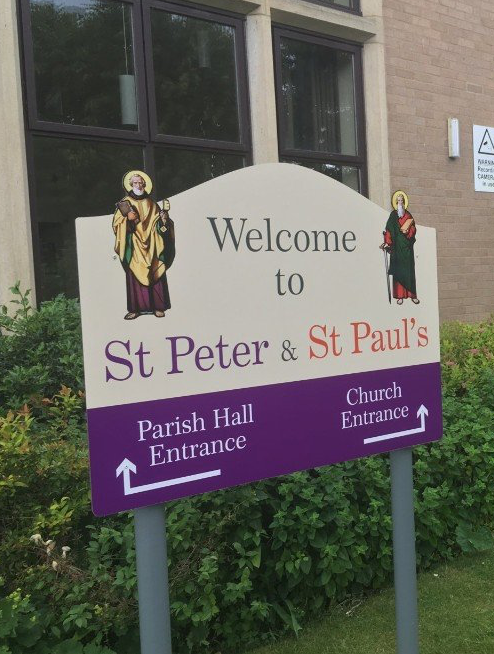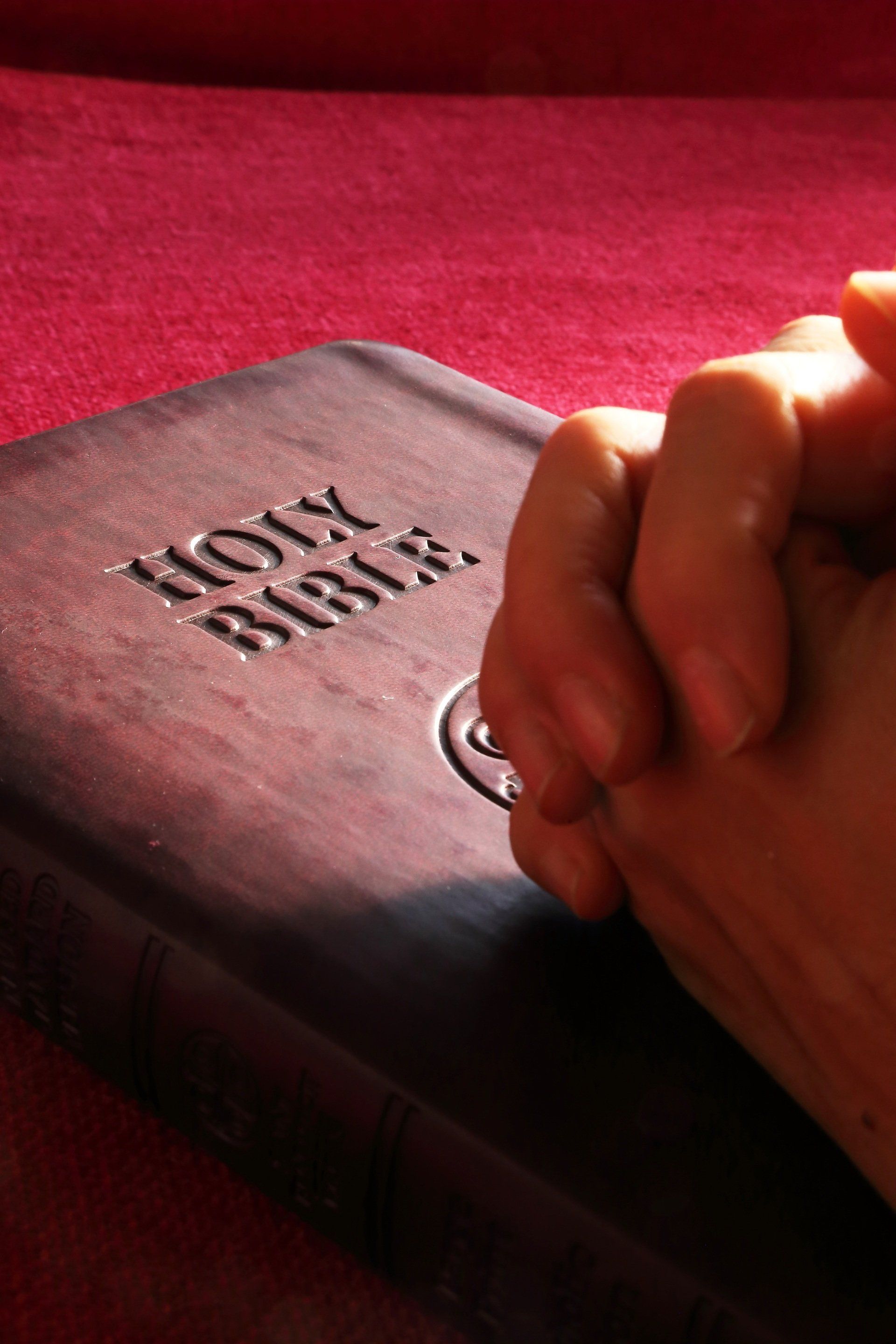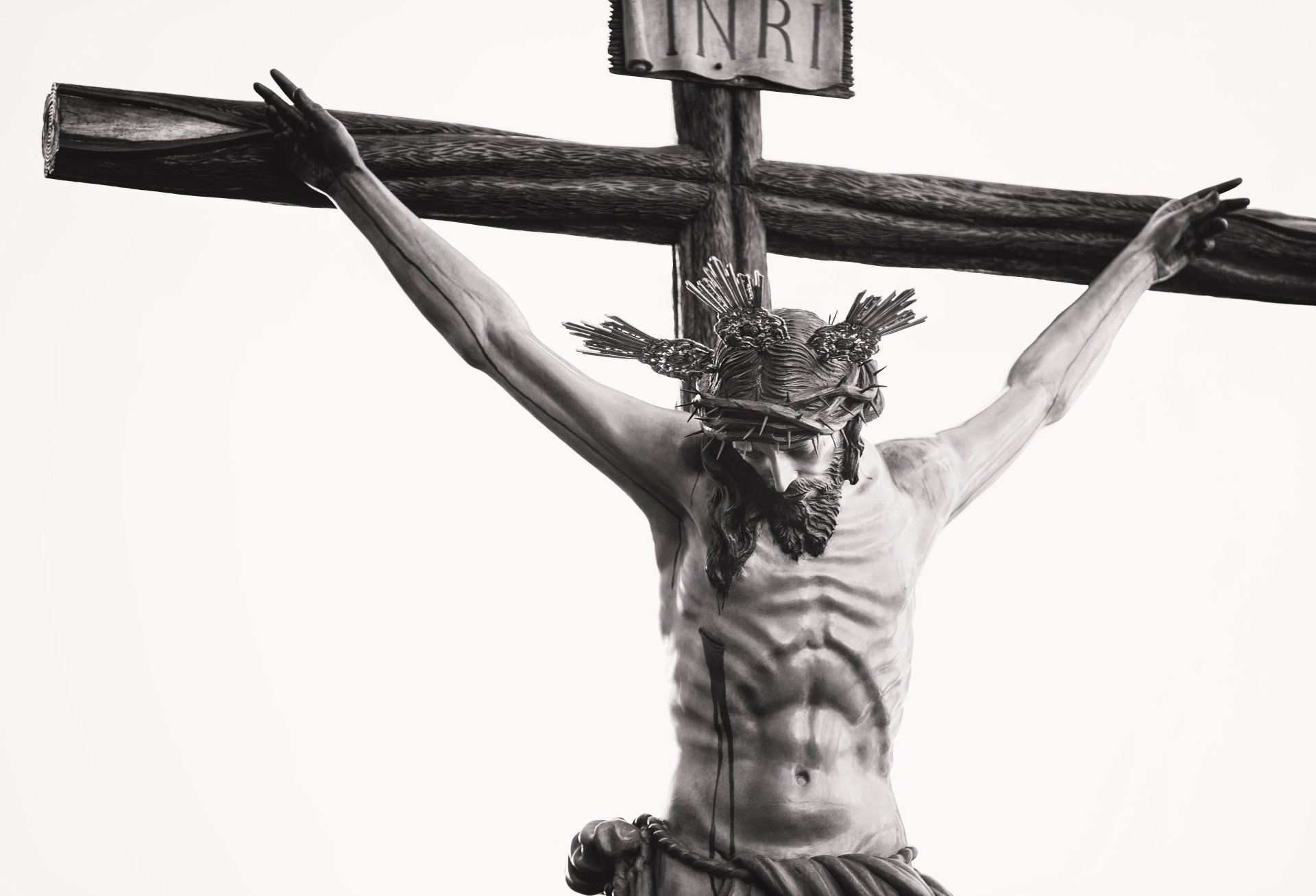Nine Things That Make Us Catholic
Perhaps before Vatican II it was easier to know “what makes us Catholic.” Back then, Catholic identity seemed more cut-and-dried. We had copious formulas, practices and sacramentals that both expressed and nurtured our being Catholic. And much of it was “real stuff”—statues and stations, relics and rosaries, and pictures to hang on the wall. That picture of the Sacred Heart seemed to keep an eye on me from every angle of my boyhood kitchen. Ask any Catholic then, “Why did God make you?” and most could stumble the same Catechism answer, “God made me to know Him, to love Him, and to serve Him in this world, and to be happy with Him forever in heaven.” On a summer work site of my youth, we could tell who Catholic was by their Friday lunch. And when Pat Murphy had a beef sandwich, we knew he was “fallen away.”
My grandmother was convinced that when the Church “did away with fish on Friday,” there was little left of the faith. Though she was wrong, her good instinct was that we’d lost a valuable practice that had long lent Catholics a sense of identity. Whether the Council intended as much, in its aftermath that old actions of Catholicism, those everyday objects that helped us to understand our faith receded from centre stage.
But instead of returning to what may seem like “good old days”—even if we could—the more refreshing strategy for this challenging time is dip deeper into our “living waters.” For example, beneath the practice of sacramentals we can rediscover the core Catholic conviction that all of life is sacramental; indeed statues and the like can daily remind us of our faith but we can also encounter God’s presence, as Irish poet Patrick Kavanagh would say, “in the bits and pieces of everyday.”
We need to have Catholic identity, but before claiming particular Catholic identity, we must first decide who we are as Christians and what we hold in common with all Christian faiths. The heart of Christian faith is not the Bible, nor the sacraments, nor the creeds, nor the Church—vital as all these are—but “a Person, the Person of Jesus of Nazareth, the only Son of the Father” ( Catechism #426). By Baptism, the fundamental and common vocation of all Christians is to become disciples of Jesus Christ—people who follow “the way” that he modelled and made more possible by his living, dying and rising.
But even as we believe Jesus saying, “In my Father’s house there are many dwelling places” (John 14:2), we should know well and embrace what is distinctive about our home within God’s family. Of course, there is no one thing that gives us our Catholic identity; it’s more a collage of convictions and commitments. I can think of nine such pieces to the puzzle—or shouldn’t we say mystery?—of Catholic faith. Very briefly now, here are nine things that make us Catholic.
1) Positive understanding of the person
Catholicism insists that the human person is essentially good, ever more graced than sinful. Oh indeed, we are capable of dreadful sin and destruction, but this is not what first defines us. God has implanted a “natural law” within our hearts that enables people to know and choose what is good, a capacity enhanced by Jesus’ dying and rising for us. And though we always need God’s help, grace empowers us to live for the kingdom, to do God’s will “on earth as it is in heaven.”
When the radical Reformers insisted that the human condition is totally corrupt (Calvin more than Luther), the Catholic Church, at the Council of Trent (1545-63), countered that the divine image was never lost to us, even in the “Fall” of Adam and Eve. In fact, it has been refurbished by the incarnation of God in Jesus Christ. That all people reflect the image and likeness of God is also the basis of Catholic teachings on the dignity of every person, on the value of human life—from womb to tomb—and that all have the same basic human rights and responsibilities. As St. Irenaeus, an early Christian author (and martyr), summarized, “the glory of God is the human person fully alive.”
2) Committed to community
Ever wonder why Catholics take Church so seriously—from going to church to being Church? It’s because we’re convinced that both our personhood and Christian faith are at heart about community. Catholicism has consistently taught that God creates us as communal beings, making us responsible for and to each other. Likewise, Christian faith calls us to bond together with other Christians like the parts of a body, as the body of Christ “for the life of the world” (John 6:51). By nature and faith, we are relational, “made for each other.”
Catholics take community so seriously as to believe that it reaches even beyond the grave. Death is no barrier to our care for each other. Because the bond of Baptism is never broken, we can pray to the saints and for the souls. This communal emphasis of Catholicism is also the foundation of its social ethic that emphasizes every citizen’s responsibility to the common good of the whole society. We must care for the common well-being as well as for our own. In both Church and society, Catholics should live as “all for one, and one for all.”
3) Sacramental outlook
A youth ministry poster from my own distant youth said wisely, “God never makes junk.” As with its outlook on the person, Catholic faith sees all of God’s creation as essentially good. Likewise, whatever humans create as participants in God’s creativity, though it can be misused for destruction, is never inherently evil. Here is why Catholicism has never condemned dancing, singing, celebrating, good food; even alcohol—and Catholics can have a little more fun. Yes, everything can be abused but all is first a gift ( gratia ) of God. Similarly, we can embrace our own lives in the world as meaningful and worthwhile, not because of our efforts but by the grace of God.
This graciousness of life in the world finds its high point in the sacramental principle that is so core to Catholic faith. This begins with the conviction that God reaches out to us and we respond through the ordinary and everyday of life, through creation, through our relationships, through all our good efforts and the experiences that come our way. Climaxed by the seven great sacraments that we celebrate in Church, the sacramental principle encourages Catholics “to see God in all things” (St. Ignatius of Loyola).
Indeed, this sacramentality of life was heightened by Jesus Christ, God’s greatest Sacrament to the world. And as Church we celebrate seven climactic “signs and instruments by which the Holy Spirit spreads the grace of Christ” ( Catechism #774), with Eucharist being “the sacrament of sacraments” (St. Thomas Aquinas). But the seven sacraments should encourage in Catholics a sacramental outlook on all of life, to ever recognise “the more in the midst of the ordinary.”
4) Catholics cherish Scripture and Tradition
A battle cry of the original Protestant Reformers was “scriptura sola,” that “scripture alone” is the source of God’s revelation. In response to the Reformers, the Council of Trent reaffirmed the centrality of sacred Scripture as “the norm of norms” for Christian faith. But it reiterated that Christian Tradition , representing the time-tested truths that emerge over the Church’s history, is also a “fountain” of divine revelation. This was Catholicism’s way of insisting that the Holy Spirit is ever present with the Church, helping to deepen our understanding and to address new questions and circumstances with the wisdom of Christian faith.
Vatican reiterated the Catholic conviction that Scripture and Tradition must be interpreted within the community of faith, the Church. In fact, Scripture, Tradition and Church “are so linked and joined together that one cannot stand without the others”; they “all work together…under the action of the Holy Spirit” for “the salvation of souls” ( Divine Revelation #9 and 10). As Catholics, we interpret Scripture and Tradition within the Church, guided by its teaching magisterium—the pope and bishops in union with him.
5) Catholics embrace holistic faith
Jesus preached the great commandment of love as requiring one’s whole person—all of mind, heart and strength. That old Catechism answer to “Why did God make you?” reflected such a holistic sense of Christian faith: “to know, love, and serve” God in this life and be happy forever in the next. Christian faith demands our whole being—head, heart and hands. There is no aspect of our lives from which our faith can be excluded. It should permeate every nook and cranny, on Mondays as well as Sundays. Likewise, faith should be exercised on every level of existence—the personal, interpersonal and political. Christians should live as disciples of Jesus in every circumstance.
The Protestant Reformers had emphasized that “faith alone” saves. They were trying to correct the undue Catholic emphasis of the time on doing certain pious practices as a way to “earn” salvation. And they had a point! Yet, Trent affirmed that indeed we are saved by faith in God and in Jesus Christ, but this faith must express itself in good works. As Jesus had counselled, we don’t enter the kingdom by confessing Jesus as Lord but by doing the will of God (see Matthew 7:21). Or, to quote the Letter of James, “Faith without works is dead” (2:17).
6) Commitment to justice
Modern Scripture scholars agree that the central theme in the preaching of Jesus was the coming of God’s reign. In keeping with his Jewish faith, Jesus understood God’s reign as personal and social, spiritual and political, for here and hereafter. It calls people to do God’s will “on earth as in heaven.” And God wills peace and justice and fullness of life for all humankind (John 10:10) and the integrity of creation. No wonder then that Jesus used the text of Isaiah 61:1-2 to launch his public ministry. He claimed to fulfil the promise of an Anointed One (Messiah) who would bring good news to the poor, liberty to captives, sight to the blind and let the oppressed go free (read Luke 4:16-21).
Catholicism has always emphasised that Christian faith demands care for the neighbour in need. But toward the end of the 19th century, the Church began to teach explicitly that our faith requires us to work for social justice. Christian faith demands that we oppose unjust social structures and work to ensure justice for all. And more than the blind “lady justice” weighing the scales in precise measure, giving everyone no more than their due (Aristotle),
the biblical and Catholic sense of justice has a largesse to it. Like their God, God’s people should side with the poor and oppressed, favouring those to whom justice is denied.
7) Universal spirituality
Spirituality is surely one of the buzzwords of our time; even people who disapprove of religion will readily claim to be “spiritual.” Indeed, the Catholic attitude is that everyone is a spiritual being. For we are alive by God’s own breath of life (Genesis 2:7), endowed with an “original” grace that draws us toward God. Philosopher Blaise Pascal summarized it when he said: “There’s a God-shaped hollow in the human heart that nothing else can fill.”
Catholicism’s greatest asset may well be its spirituality and the extraordinary variety of spiritual charisms (gifts) that mark its life. It is in stark contrast to much of what passes for “new age” spirituality—a warm, fuzzy feeling about a very private relationship with the divine. Catholic spirituality can be summarized as “putting faith to work”—allowing
Christian faith to permeate every aspect of daily life. It is sustained by our active membership in a Christian faith community and through disciplines of prayer, worship and conversation. It bears the fruits of compassion, justice and peace for ourselves and for the world.
8) Catholics are ‘catholic’
We like to say that catholic means “universal,” and indeed it does. That was Aristotle’s favoured meaning of the word. Its roots are the Greek katha holos, which literally mean, “to include everyone.” This was likely why early Christian authors like St. Augustine began to use it to describe the Christian community. However, James Joyce may have said it best (in Finnegan’s Wake ), “ catholic means ‘here comes everybody.'”
To be catholic calls a community to welcome all people, regardless of their human circumstances. It demands that we reach out with love for everyone, neighbours next door and on the far side of the world—to care without borders. It requires that we respect people with religions that are different from ours, being open to dialogue and learning from them (Vatican II, On Non-Christian Religions , #2). And St. Augustine’s favoured use of catholic was “to be open to the truth, wherever it can be found.” Insularity and closed-mindedness are against the Catholic faith.
9) Devotion to Mary
Since the beginning of the Church, Mary has held pride of place in the communion of saints. And why wouldn’t she, given her role as the mother of Jesus—the one who bore him, raised him to adulthood and was at the foot of the cross. In that moment of terrible suffering, we believe that through his words to St. John, “Behold, your mother,” Jesus gave over Mary as mother to disciples ever after (read John 19:26-27).
Our turning to Mary is based on the fact she gave birth to our Saviour and on a very human instinct. We remember how she interceded with Jesus at the wedding feast of Cana; though he didn’t feel ready to launch his public ministry, he honoured the request of his mother. Surely for a good son, this pattern continues in eternity. If Mother Mary intercedes for us, how can Jesus decline?
In the years prior to celebrating the Second Millennium, Pope John Paul II repeatedly called Catholics to ask forgiveness for the many ways and times that we have failed to live up to our faith. We must lament and repent that the core convictions outlined above have often been more honored in the breach than the observance. Yet, woven together, they ever challenge us with the great life-giving vision that is Catholic faith. There is no more worthy way to live than with those beautiful truths and values that make us Catholic.
Thomas H. Groome is Professor of Theology and Religious Education at Boston College and director there of the Institute of Religious Education and Pastoral Ministry. This is adapted from his book What Makes Us Catholic: Eight Gifts for Life (HarperCollins, 2002), also available from Recorded Books (read by author) at 800-638-1304.








